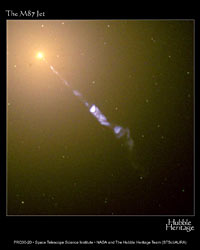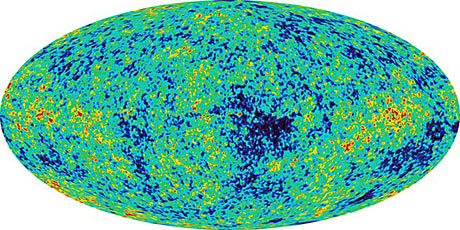|
In "3. superstring theory" we discussed some projects aiming at the construction of unified theory including gravity. In the KEK theory group we also investigate open problems associated with gravity itself. Although general relativity describes classical gravity as is verified very accurately, there still remain many unsolved mysteries concerning black holes and the early universe, in which the influence of gravity becomes quite large.
Black hole
 In recent years, black holes play an essential role in astronomical observations. In fact a lot of candidates for black holes have been found (see the photo on the right). Although black holes seem to be common objects in the universe, we are still far from their complete understanding. In recent years, black holes play an essential role in astronomical observations. In fact a lot of candidates for black holes have been found (see the photo on the right). Although black holes seem to be common objects in the universe, we are still far from their complete understanding.
First we cannot avoid the occurrence of a point singularity if a black hole exists (Hawking-Penrose's singularity theorem). We cannot tell what happens near the singularity, since the existence of a singularity implies the breakdown of general relativity. Next it is known that the time evolution of a black hole is not unitary if we take quantum effects into account (the information paradox). This implies that quantum mechanics breaks down in the presence of a black hole. This paradox poses a serious problem, since quantum mechanics underlie all the contemporary physics, and there is no sign of its breaking in any experiments and theories. Some researchers suspect that the solution to the aforementioned singularity problem is the key to resolve the information paradox.
Early universe
It is clear from the WMAP results (see the photo below) and the observation of Type Ia supernova in recent years that the universe began with a period of rapidly accelerated expansion called the inflation and it is now in a period of slowly accelerated expansion. In spite of these progress in observational cosmology, it is not easy to understand what causes these accelerated expansions in the framework of general relativity. For this reason, innumerable inflationary cosmological models have been proposed. Most of these models contain various parameters, which are set to some values without any reasons. Moreover, inflationary universe begins at a singular point due to the aforementioned singularity theorem.

Quantum description of black holes based on superstring theory
All these problems arise because our discussion is based on classical general relativity. Therfore it is anticipated that we need to quantize gravity in order to resolve these problems. For example, superstring theory is known as a theory which correctly describes gravity quantum mechanically, and it is expected to resolve the aforementioned problems. In fact, it has been shown that one can describe supersymmetric black holes (a special type of black holes) quantum mechanically owing to a series of discoveries since 1996. Although what has been resolved so far is merely a part of the above-mentioned problems concerning black holes, it is nevertheless remarkable that we were able to give an answer to a mystery which has been unsolved for more than twenty years. It is expected that it will not be long before superstring theory resolves a series of problems concerning gravity.
Field theoretical approach to quantum gravity
There are also some researchers who are pursuing the approach to quantum gravity in the framework of field theory analogously to other three interactions. In that approach, the metric field, which appears in general relativity (the field which represents the curvature of space-time), is treated as the counterpart of the vector potential in electromagnetism. However, we cannot systematically deal with the divergence that arises in the process of perturbative calculations in the case of Einstein gravity unlike the case of the other three interaction. This is the reason why it is often said that quantization of gravity is difficult. There is a possibility, however, that we can correctly quantize gravity by considering a formulation which are not based on perturbation theory, like lattice gauge theory in usual gauge theory. In our group, this problem has been investigated by using techniques such as ``dynamical triangulation'' and ``epsilon expansion'', and a lot of new results have been produced.
Some researchers consider that the notion of distance is lost when the gravitational force becomes strong, for instance in the early universe. It is then argued that the scale invariant space-time is realized, because the quantum fluctuation of the gravitational field is very large. ``Conformal quantum gravity'' has been proposed as a theory which describes such a space-time based on a scale invariant action. In this approach one separates the so-called conformal mode of the metric, and quantize it non-perturbatively as a conformal field theory. The goal is to construct quantum gravity without divergences by treating only the conformal mode non-perturbatively while treating other modes perturbatively. In fact, this theory reproduces the results of numerical simulation based on ``dynamical triangulation'', and it is expected to be a consistent theory of quantum gravity.
It has been also attempted to describe the early universe by using ``conformal quantum gravity''. As a possible scenario, it has been speculated that the universe began as a scale invariant quantum space-time, and that it went through the inflation epoch before it developed into the classical Friedmann space-time observed at present. Some calculations based on this scenario reproduce the observational results of WMAP.
Fundamental aspects of quantum theory
As we have mentioned above, there is a possibility that unitarity and causality are broken in the process of black holes formation and evaporation. This brings us the idea that we might be able to find some clue to resolve these problems within the flamework of quantum mechanics itself. One of the approaches in this direction is to formulate a singularity mathematically in quantum mechanics and to investigate the physical phenomena that can arise from it. Until recently, fundamental issues such as non-locality in quantum mechanics, the observation problem, and the relation between classical theory and quantum theory, used to be discussed only by means of gedanken experiments. Owing to the recent developments in experimental techniques, however, these issues have become a subject of positive science of the 21st century. Such topics are also investigated in the KEK theory group.
|